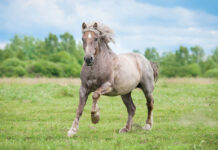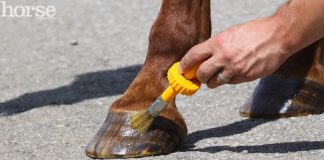
Perhaps the quintessential question of winter horsekeeping is, to blanket or not to blanket? If you decide to clip your horse for the winter because of your active riding schedule, that’s an easy answer: blanket. But if you leave your horse’s natural winter coat alone, will he need something extra? The answer depends on how thick your horse’s coat is, the age and overall health of the horse, how severe the weather gets, and your horse’s housing.
If you elect to blanket your horse, there are a few considerations to keep in mind. At the start of the winter season, inspect your horse’s blanket for needed repairs and cleanliness. When you put the blanket on, check the fit for areas that could potentially cause rubs and tight places that might pinch. Rubs from a dirty blanket are havens for microbes that can cause skin problems. Even if the blanket seems to be a good fit, re-check it after your horse has worn it for a day or two.
Keeping your horse too warm with a blanket can also be a problem. Over-blanketing leads to sweating, which chills the horse under his blanket. If you notice your horse coming in from the pasture wet under his blanket, switch to a lighter one.
Most healthy horses with full, natural winter coats can get away without being blanketed. Some exceptions to this would be horses without outdoor shelter from wet, windy conditions; horses that don’t grow a substantial coat, like some Arabians and Thoroughbreds; or horses that are old or sick and can’t maintain body weight without an extra layer of insulation.
Back to Horse Health in Winter >>
This article originally appeared in the November 2014 issue of Horse Illustrated. Click here to subscribe!






Thanks for simplifying what seemed like a very complicated topic.